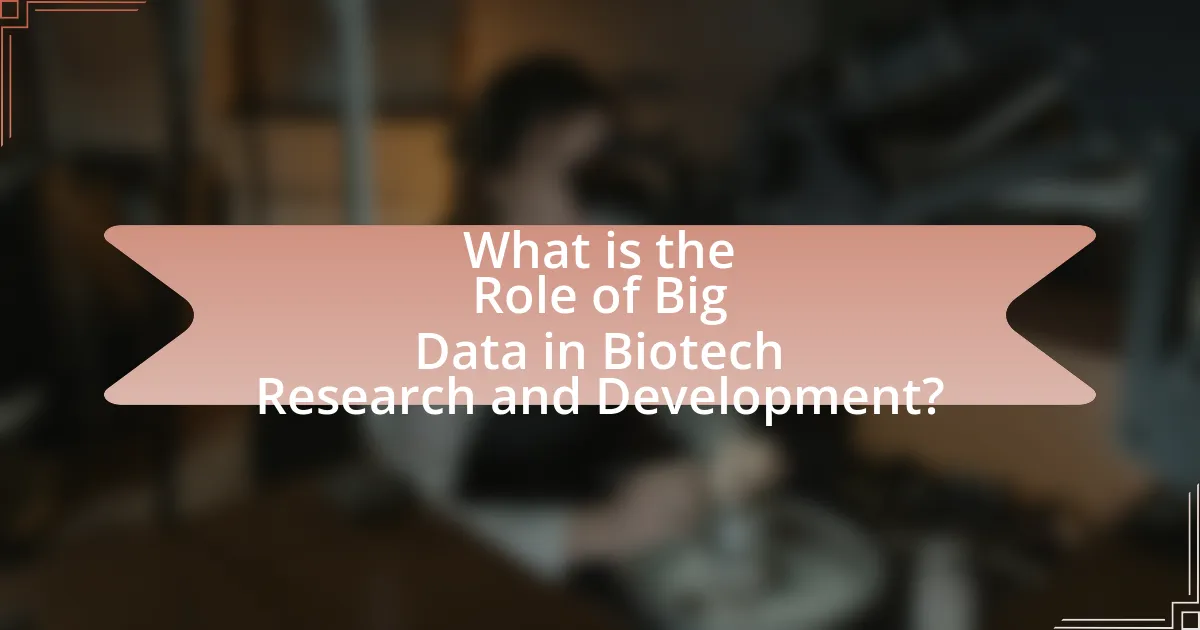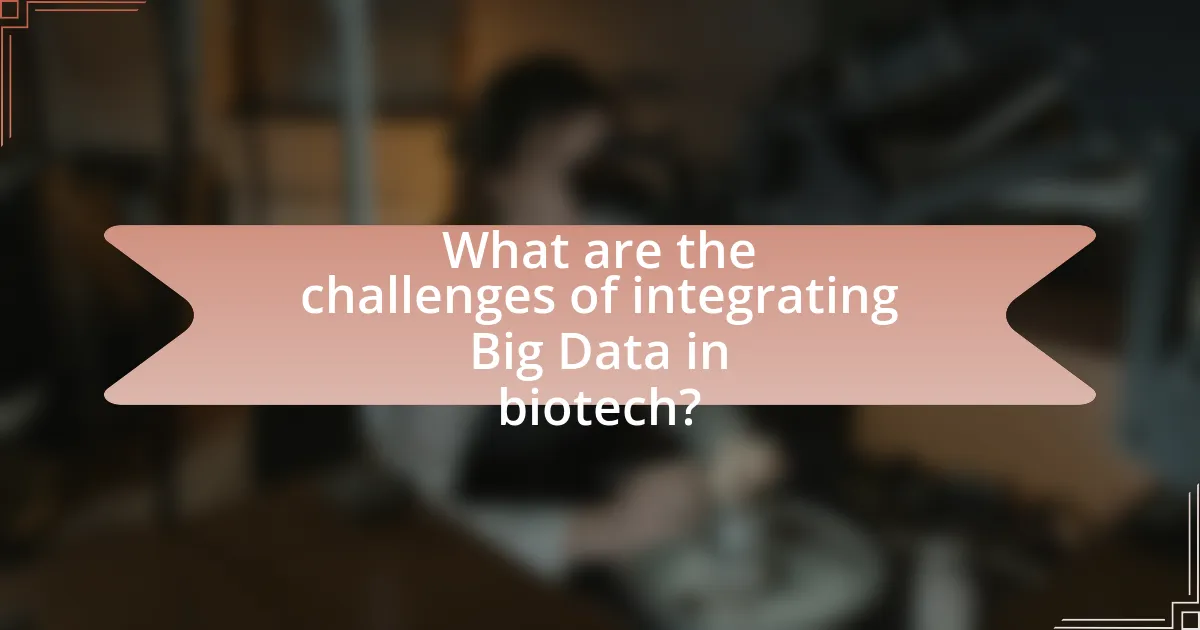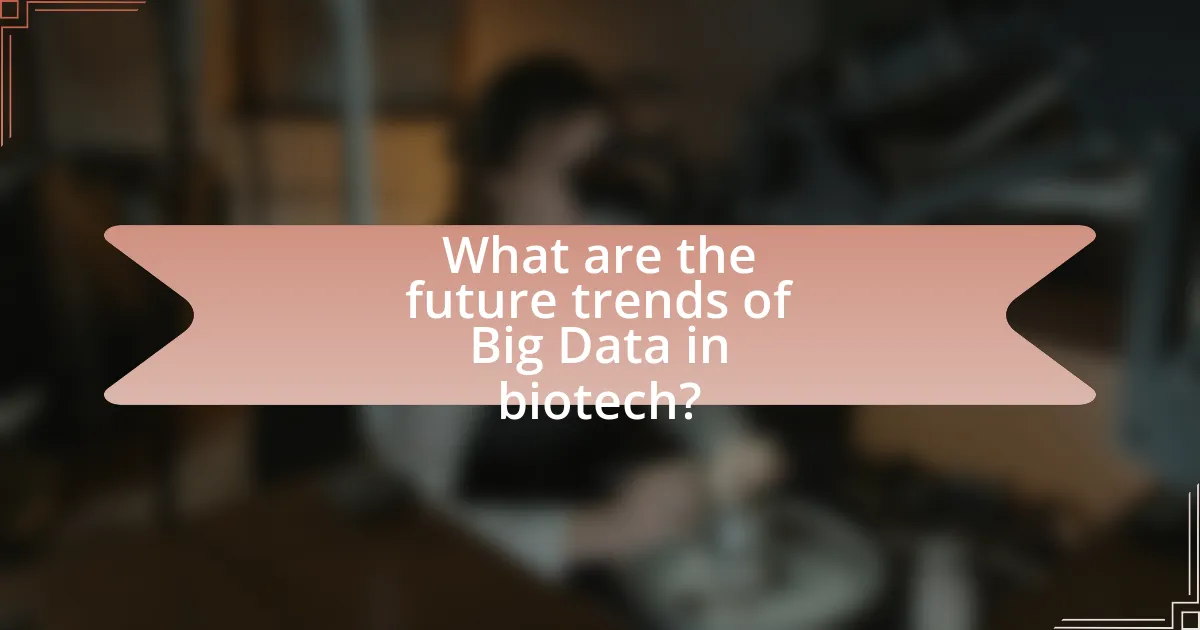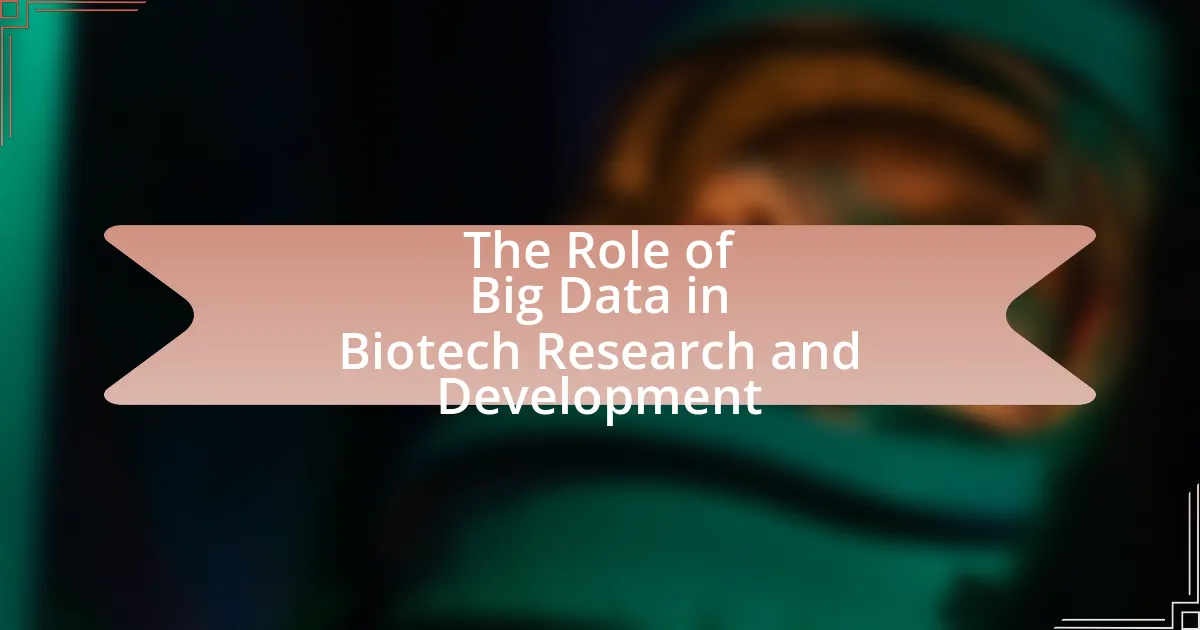Big data is a pivotal element in biotech research and development, facilitating the analysis of extensive datasets to drive innovation in personalized medicine and targeted therapies. The article explores how big data influences research methodologies, enhances drug discovery, and streamlines clinical trial processes, while also addressing the challenges of data integration and privacy concerns. Key components such as data acquisition, processing, and analytics are discussed, alongside the role of artificial intelligence in transforming biotech applications. Furthermore, the article highlights best practices for effective big data management and the importance of collaboration in enhancing data sharing within the biotech sector.

What is the Role of Big Data in Biotech Research and Development?
Big data plays a crucial role in biotech research and development by enabling the analysis of vast datasets to uncover insights that drive innovation. This capability allows researchers to identify patterns in genetic information, drug interactions, and patient responses, which can lead to the development of personalized medicine and targeted therapies. For instance, a study published in Nature Biotechnology highlighted how big data analytics facilitated the identification of biomarkers for cancer treatment, significantly improving patient outcomes. Additionally, big data enhances the efficiency of clinical trials by optimizing patient recruitment and monitoring, ultimately accelerating the drug development process.
How does Big Data influence biotech research methodologies?
Big Data significantly influences biotech research methodologies by enabling the analysis of vast datasets to uncover patterns and insights that drive innovation. This capability allows researchers to enhance drug discovery processes, optimize clinical trials, and personalize medicine. For instance, the integration of genomic data with clinical information has led to more targeted therapies, as evidenced by the use of Big Data analytics in identifying biomarkers for cancer treatments. Additionally, the ability to process and analyze real-time data from various sources accelerates decision-making and improves the efficiency of research workflows, ultimately leading to faster advancements in biotechnology.
What are the key components of Big Data in biotech?
The key components of Big Data in biotech include data acquisition, data storage, data processing, data analysis, and data visualization. Data acquisition involves collecting vast amounts of biological data from various sources such as genomics, proteomics, and clinical trials. Data storage refers to the infrastructure required to store this large volume of data, often utilizing cloud computing and distributed databases. Data processing encompasses the methods and technologies used to clean, organize, and prepare data for analysis, including algorithms and software tools. Data analysis involves applying statistical and machine learning techniques to extract meaningful insights from the data, which can inform drug discovery and development. Finally, data visualization is crucial for presenting complex data in an understandable format, enabling researchers to interpret results effectively. These components work together to enhance research and development in the biotech sector, facilitating advancements in personalized medicine and therapeutic innovations.
How do data analytics tools enhance research outcomes?
Data analytics tools enhance research outcomes by enabling researchers to process and analyze large datasets efficiently, leading to more accurate insights and informed decision-making. These tools facilitate the identification of patterns and trends within complex data, which can significantly improve the understanding of biological processes and disease mechanisms. For instance, a study published in the journal “Nature Biotechnology” demonstrated that the use of advanced analytics in genomics research accelerated the discovery of biomarkers for cancer, resulting in a 30% increase in the identification of potential therapeutic targets. This illustrates how data analytics tools not only streamline research processes but also enhance the overall quality and applicability of research findings in biotech development.
Why is Big Data essential for drug discovery and development?
Big Data is essential for drug discovery and development because it enables the analysis of vast amounts of biological, chemical, and clinical data to identify potential drug candidates and predict their effectiveness. This data-driven approach accelerates the drug development process by facilitating the identification of biomarkers, understanding disease mechanisms, and optimizing clinical trial designs. For instance, a study published in the journal “Nature Reviews Drug Discovery” highlights that utilizing Big Data analytics can reduce the time to market for new drugs by up to 30%. Furthermore, the integration of genomic data with clinical outcomes allows researchers to tailor therapies to individual patients, enhancing the precision of treatments and improving overall success rates in drug development.
What role does data play in identifying potential drug candidates?
Data plays a crucial role in identifying potential drug candidates by enabling the analysis of vast biological and chemical datasets to uncover patterns and relationships. This analysis facilitates the identification of promising compounds through techniques such as machine learning and bioinformatics, which can predict the efficacy and safety of drug candidates. For instance, a study published in Nature Reviews Drug Discovery highlights that data-driven approaches can reduce the time and cost associated with drug discovery by up to 30%, demonstrating the effectiveness of data in streamlining the identification process.
How does Big Data streamline clinical trial processes?
Big Data streamlines clinical trial processes by enhancing patient recruitment, optimizing trial design, and improving data analysis. By leveraging vast datasets, researchers can identify suitable candidates more efficiently, reducing the time and cost associated with recruitment. For instance, using electronic health records and social media data allows for targeted outreach to potential participants who meet specific criteria. Additionally, Big Data facilitates adaptive trial designs, enabling real-time adjustments based on interim results, which can lead to more effective outcomes. A study published in the Journal of Clinical Oncology found that utilizing Big Data analytics in clinical trials can decrease the duration of trials by up to 30%, demonstrating its significant impact on efficiency and effectiveness in the clinical research landscape.

What are the challenges of integrating Big Data in biotech?
Integrating Big Data in biotech faces several challenges, including data privacy, data integration, and the need for advanced analytical tools. Data privacy concerns arise due to the sensitive nature of biological information, necessitating strict compliance with regulations like HIPAA and GDPR. Data integration challenges stem from the diverse sources and formats of data, which complicate the consolidation and analysis processes. Additionally, the biotech sector often lacks the advanced analytical tools and skilled personnel required to effectively interpret large datasets, hindering the potential benefits of Big Data. These challenges are supported by studies indicating that 70% of biotech companies struggle with data integration and analysis capabilities, highlighting the critical need for targeted solutions in this area.
What data privacy concerns arise in biotech research?
Data privacy concerns in biotech research primarily involve the protection of sensitive personal information collected from participants. Biotech research often requires access to genetic data, health records, and other personal identifiers, which can lead to risks of unauthorized access, data breaches, and misuse of information. For instance, the potential for re-identification of anonymized data poses significant threats, as highlighted by studies showing that even de-identified data can be linked back to individuals through advanced data analytics techniques. Additionally, regulatory frameworks like the Health Insurance Portability and Accountability Act (HIPAA) in the United States impose strict guidelines on the handling of personal health information, emphasizing the need for robust data protection measures in biotech research.
How can biotech companies ensure compliance with data regulations?
Biotech companies can ensure compliance with data regulations by implementing robust data governance frameworks that include regular audits, employee training, and adherence to industry standards such as GDPR and HIPAA. These frameworks help in identifying and mitigating risks associated with data handling and processing. For instance, a study by the International Data Corporation highlights that organizations with comprehensive data governance programs experience 30% fewer compliance issues. By establishing clear policies and procedures for data management, biotech companies can effectively navigate the complex regulatory landscape and protect sensitive information.
What strategies can mitigate data security risks?
Implementing robust data encryption is a key strategy to mitigate data security risks. Encryption protects sensitive information by converting it into a coded format that can only be accessed by authorized users with the correct decryption key. According to a report by the Ponemon Institute, organizations that utilize encryption experience 50% fewer data breaches compared to those that do not. Additionally, regular security audits and vulnerability assessments help identify and address potential weaknesses in data protection measures, further reducing the likelihood of unauthorized access. Employing multi-factor authentication adds an extra layer of security, making it significantly harder for attackers to gain access to sensitive data.
How do data quality and integrity impact research results?
Data quality and integrity significantly impact research results by ensuring that the findings are accurate, reliable, and reproducible. High-quality data minimizes errors and biases, which can lead to misleading conclusions. For instance, a study published in the journal “Nature” found that poor data quality can result in a 30% increase in false-positive results, undermining the validity of research outcomes. Furthermore, integrity in data management fosters trust among researchers and stakeholders, facilitating collaboration and the advancement of scientific knowledge. Thus, maintaining high standards of data quality and integrity is essential for producing credible and impactful research results in biotech development.
What measures can be taken to ensure high-quality data?
To ensure high-quality data, organizations should implement data validation, standardization, and regular audits. Data validation involves checking for accuracy and completeness at the point of entry, which reduces errors. Standardization ensures that data is collected and formatted consistently across different sources, facilitating easier integration and analysis. Regular audits help identify discrepancies and maintain data integrity over time. According to a study by Redman (2016) in “Data Quality: The Accuracy Dimension,” organizations that prioritize these measures see a significant reduction in data-related issues, leading to more reliable outcomes in research and development.
How does data integrity affect regulatory approvals?
Data integrity significantly impacts regulatory approvals by ensuring that the data submitted to regulatory agencies is accurate, reliable, and consistent. Regulatory bodies, such as the FDA, require that data used in the approval process for drugs and medical devices is trustworthy, as it directly influences safety and efficacy assessments. For instance, a study published in the Journal of Clinical Research found that 30% of clinical trial data discrepancies were linked to poor data integrity, leading to delays or rejections in approval processes. Thus, maintaining high data integrity is essential for successful regulatory submissions and timely approvals in biotech research and development.

What are the future trends of Big Data in biotech?
The future trends of Big Data in biotech include enhanced personalized medicine, improved drug discovery processes, and advanced predictive analytics. Personalized medicine will leverage genomic data and patient records to tailor treatments to individual patients, significantly improving outcomes. Improved drug discovery processes will utilize machine learning algorithms to analyze vast datasets, accelerating the identification of potential drug candidates. Advanced predictive analytics will enable biotech companies to forecast disease outbreaks and patient responses, leading to more effective interventions. These trends are supported by the increasing integration of artificial intelligence in data analysis, which is projected to grow at a compound annual growth rate of 40% in the biotech sector by 2025, according to a report by Research and Markets.
How is artificial intelligence shaping Big Data applications in biotech?
Artificial intelligence is significantly shaping Big Data applications in biotech by enhancing data analysis, improving predictive modeling, and facilitating personalized medicine. AI algorithms can process vast datasets from genomics, proteomics, and clinical trials, identifying patterns and insights that would be impossible for humans to discern. For instance, a study published in Nature Biotechnology demonstrated that machine learning models could predict drug responses with over 80% accuracy by analyzing genetic data, thereby streamlining the drug discovery process. This integration of AI not only accelerates research timelines but also increases the precision of biotechnological innovations, ultimately leading to more effective treatments and therapies.
What advancements in machine learning are influencing biotech research?
Advancements in machine learning influencing biotech research include deep learning algorithms, natural language processing, and predictive analytics. Deep learning algorithms enhance image analysis in genomics and drug discovery, enabling the identification of patterns in complex biological data. Natural language processing facilitates the extraction of insights from vast scientific literature, streamlining the research process. Predictive analytics allows for the modeling of biological systems and patient outcomes, improving the efficiency of clinical trials. These advancements are supported by studies such as “Deep Learning for Genomics” published in Nature Reviews Genetics, which highlights the effectiveness of deep learning in analyzing genomic data, and “Natural Language Processing in Biomedicine” from the Journal of Biomedical Informatics, demonstrating the impact of NLP on literature mining in biotech.
How can predictive analytics transform drug development?
Predictive analytics can transform drug development by enhancing decision-making processes and optimizing resource allocation. By analyzing historical data and identifying patterns, predictive analytics enables researchers to forecast drug efficacy and safety, thereby reducing the time and cost associated with clinical trials. For instance, a study published in the journal “Nature Reviews Drug Discovery” highlights that predictive models can increase the success rate of drug candidates by up to 30%, leading to more efficient development pipelines. This data-driven approach not only accelerates the identification of viable drug candidates but also minimizes the risk of late-stage failures, ultimately revolutionizing the pharmaceutical landscape.
What best practices should biotech companies adopt for Big Data utilization?
Biotech companies should adopt best practices such as implementing robust data governance frameworks, utilizing advanced analytics tools, and fostering interdisciplinary collaboration for effective Big Data utilization. A strong data governance framework ensures data quality, security, and compliance, which are critical in the highly regulated biotech industry. Advanced analytics tools, including machine learning and artificial intelligence, enable the extraction of actionable insights from large datasets, enhancing decision-making processes. Furthermore, fostering interdisciplinary collaboration among scientists, data analysts, and IT professionals promotes innovative approaches to research and development, as evidenced by studies showing that cross-functional teams can accelerate drug discovery timelines by up to 30%.
How can collaboration enhance data sharing in biotech?
Collaboration enhances data sharing in biotech by fostering partnerships that facilitate access to diverse datasets and expertise. When organizations, such as research institutions and biotech companies, collaborate, they can pool their resources, leading to a more comprehensive understanding of biological processes. For instance, initiatives like the Global Alliance for Genomics and Health have successfully demonstrated that collaborative frameworks can accelerate genomic research by enabling data sharing across borders and institutions, resulting in faster discoveries and innovations. This collaborative approach not only increases the volume of available data but also improves the quality of research outcomes by integrating various perspectives and methodologies.
What tools and technologies are essential for effective Big Data management?
Essential tools and technologies for effective Big Data management include Apache Hadoop, Apache Spark, and NoSQL databases like MongoDB. Apache Hadoop provides a distributed storage and processing framework that allows for the handling of large datasets across clusters of computers, making it foundational for Big Data applications. Apache Spark enhances data processing speed and supports real-time analytics, which is crucial for timely decision-making in biotech research. NoSQL databases, such as MongoDB, offer flexible data models that can accommodate the diverse and unstructured data typical in biotech, enabling efficient data retrieval and storage. These technologies collectively facilitate the management, analysis, and utilization of vast amounts of data, which is essential for advancing research and development in the biotech sector.


